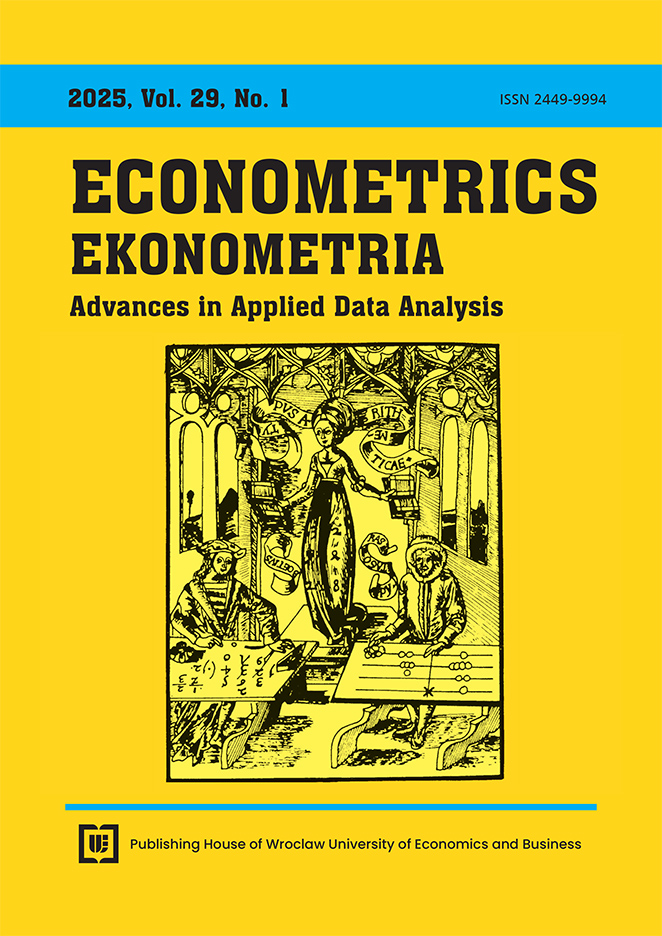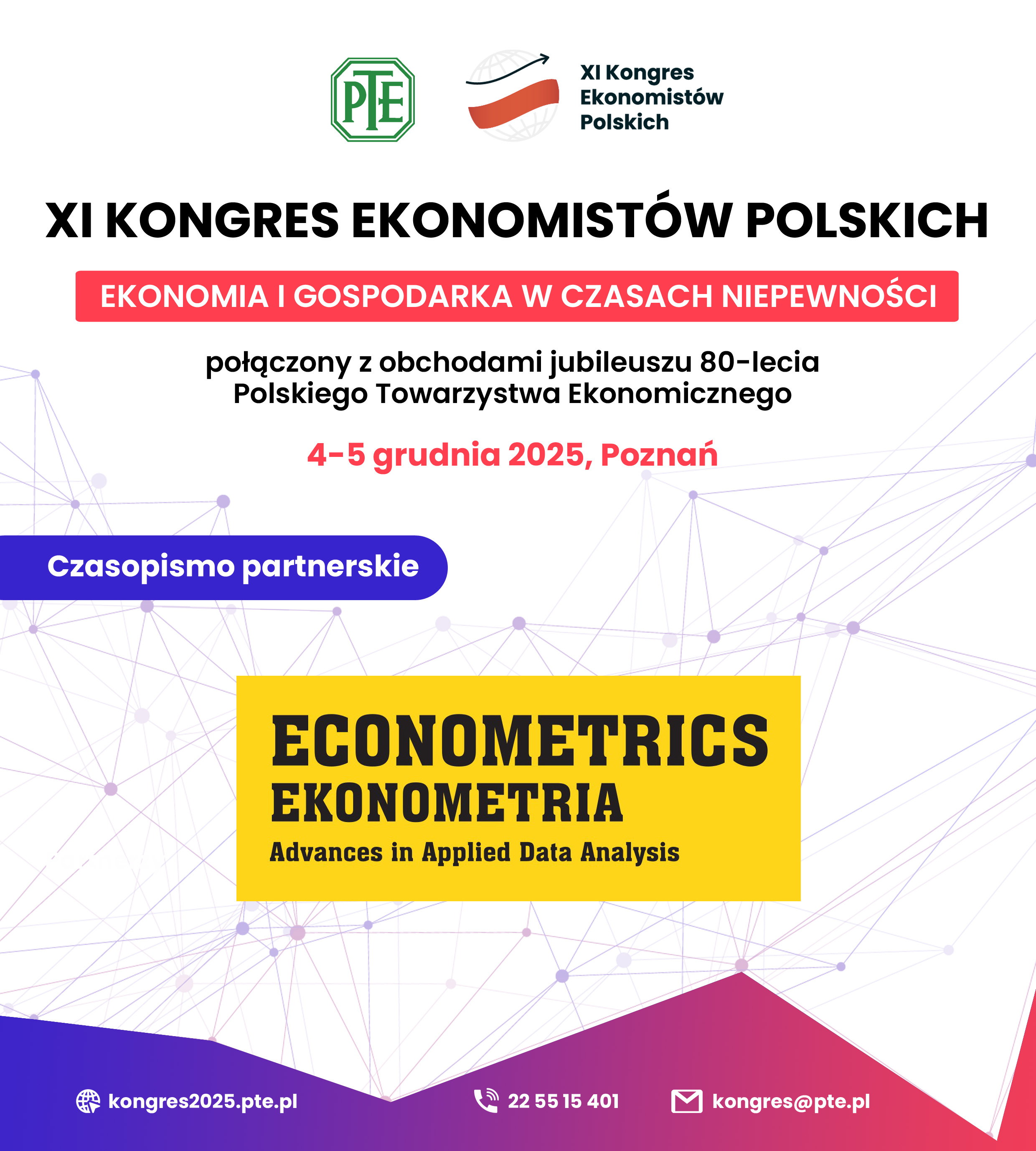Household Production Satellite Account as an Integral Account for Estimating Value Added in the National Economy
DOI:
https://doi.org/10.15611/eada.2025.1.01Keywords:
household production, input method, satellite accounts, time use survey, unpaid workAbstract
Aim: Satellite accounts provide an integrated economic framework that complements the System of National Accounts (SNA) by capturing economic activities not fully represented in core statistics. This study presents the Household Production Satellite Account (HPSA) as an example of best practices in extending official statistics. The primary goal is to estimate the monetary value of domestic work and household production (market and non-market) in Poland, contributing to an extended GDP model.
Methodology: Following the ESA 2010 methodology, this study applies the input and replacement cost methods to assess unpaid labour, using the specialist wage approach to estimate housework value. Results: In 2023, Poland’s GDP was PLN 3,410.1 billion, with non-SNA household production accountting for additional 46.5% to GDP. The value of domestic labour was PLN 1,605.9 billion, representing 79.9% of non-market household production. When using an extended economic framework, household production constituted 34.6-36.5% of the national economy.
Implications and recommendations: The results highlight the substantial contribution of household production, often overlooked in economic assessments. Regular valuation of satellite accounts, as recommended by Eurostat and UNECE, would improve economic analysis. Integrating these accounts into national statistics provides a more comprehensive view of household contributions, reducing distortions in economic indicators.
Originality/value: The most anticipated outcome of the analysis was the estimation of the gross value added of non-market household production and its comparison to the GDP for the total national economy across from 2003 to 2023.
Downloads
References
Becker, G.S. (1965). A theory of the allocation of time. Economic Journal, 65, 493-517.
Becker, G.S. (1973). A theory of marriage: Part I. Journal of Political Economy, 81(4), 813-846.
Becker, G.S. (1990). The allocation of time and goods over time, in: G.S. Becker (ed.), The Economic Approach to Human Behaviour, Chicago: University of Chicago Press, 115-129.
Lequiller, F., & Blades, D. (2014). Understanding National Accounts: Second Edition, OECD Publishing. http://dx.doi.org/10.1787/9789264214637-en
Błaszczak-Przybycińska, I. (2005). Wycena pracy własnej gospodarstw domowych na podstawie badania budżetu czasu, in: Budżet czasu ludności 1 VI 2003-31 V 2004, Warszawa: GUS, 76-98.
Błaszczak-Przybycińska, I. (2007). Estimation of unpaid work in Polish households, Statistics in Transition, vol. 8, no. 3, 547-561.
Błaszczak-Przybycińska, I. (2008). Produkcja gospodarstw domowych jako czynnik dochodotwórczy, (Household production as an income-generating factor), Warszawa: Oficyna Wydawnicza SGH.
Błaszczak-Przybycińska, I., & Marszałek M. (2015). Wycena wartości pracy własnej gospodarstw domowych na podstawie badania budżetu czasu, in: Budżet czasu ludności 2013. Cz. 1, Warszawa: GUS, 131-183.
Błaszczak-Przybycińska, I., & Marszałek, M. (2019). Satellite account of household production. Methodological remarks and results for Poland, Econometrics, Vol. 23, No. 1, 61-76, https://doi.org/10.15611/eada.2019.1.05
Błaszczak-Przybycińska, I., & Marszałek, M. (2020a). Transfery czasu pracy i przepływy międzypokoleniowe w gospodarstwach domowych w Polsce, in: J. Szczepaniak-Sienniak (Eds.), Ekonomia polityki rodzinnej. Wybrane zagadnienia. Wrocław: Wydawnictwo Uniwersytetu Ekonomicznego we Wrocławiu, 61-78.
Błaszczak-Przybycińska I., & Marszałek. M. (2020b). Gospodarowanie czasem, in: T. Panek (Eds.). Statystyka społeczna, Warszawa: PWE, 405–436.
Casero, V., & Angulo, C. (2008). A satellite account of the households in Spain. Results derived from Time Use Survey 2002-2003. Working paper 1/08. Madrid: Instituto Nacional de Estadistica.
Duran, M-A. (2007). The Satellite account for unpaid work in the community of Madrid. La Suma de Todos. Community de Madrid 36.
Dziedzic, E., Kachniewska, M., Łopaciński, K., & Skalska, T. (2007). Rachunek satelitarny turystyki dla Polski 2003-2004 (Tourism Satellite Account for Poland 2003-2004). Warszawa.
Dziedzic, E., Kachniewska, M., Łopaciński, K., & Skalska, T. (2009). Rachunek satelitarny turystyki dla Polski 2006 (Tourism Satellite Account for Poland 2006). Warszawa.
Eurostat (2003). Household Production and Consumption. Proposal for a Methodology of Household Satellite Accounts. Theme 3 – Population and Social Conditions, Working Papers and Studies, Luxembourg.
Eurostat (2013). European System of Accounts – ESA 2010. Chapter 22: Satellite accounts. Luxembourg. ISBN 978-92-79-31242-7; doi:10.2785/16644
Eurostat (1999). Proposal for a Satellite Account Household Production, Eurostat Working Papers, 9, Luxembourg.
Fender, V. (2012). Using an output approach to measuring household production, Office for National Statistics, Newport.
Fraumeni, B., & Vojtech, C.M. (2009). Accounting for household production: a prototype satellite account using the American Time Use Survey, The Review of Income and Wealth, Vol. 55, 2, 205-225. https://doi.org/10.1111/j.1475-4991.2009.00319.x
FSO (2022). Swiss Labour Force Survey (SLFS), module "Unpaid work", Swiss Earnings Structure Survey (ESS), labour cost structural statistics (ECM). Monetary valuation of unpaid work, 2020: https://www.bfs.admin.ch/bfs/en/home/statistics/work-income/employment-working-hours/balancing-unpaid-work/household-production-satellite-account.html
Hawrylyshyn, O. (1976). The value of household services: A survey of empirical estimates. The Review of Income and Wealth, 22, 101-131.
Holloway, S., Short, S., & Tamplin, S. (2002). Household Satellite Account (Experimental) Methodology, Office for National Statistics, United Kingdom.
Gershuny, J. (2005). Time Allocation and the Comprehensive Accounting of Economic Activity. Working Papers of the Institute for Social and Economic Research, 8, Colchester: University of Essex.
Goś-Wójcicka, K., Knapp, A., Makowska-Belta, E., Marszałek, M., Sekuła, T., & Stasiak-Jaśkiewicz, U. (2021). Social Economy Satellite Account for Poland 2018 (Rachunek satelitarny gospodarki społecznej dla Polski za 2018 r.) Warszawa: ZWS GUS.
GUS (1999). Rachunek satelitarny nauki 1996–1997, red. Z. Żółkiewski, „Z Prac Zakładu Badań Statystyczno-Ekonomicznych. Studia i Prace”, z. 265, Warszawa: ZWS GUS;
Rejn, B., and Żółkiewski, Z. (1997). Rachunek satelitarny nauki 1994–1995, „Z Prac Zakładu Badań Statystyczno-Ekonomicznych”, z. 246, Warszawa: ZWS GUS.
GUS (2020). Satelitarny rachunek zdrowia w 2019 r. Kraków: Urząd Statystyczny w Krakowie.
GUS (2021). Satelitarny rachunek ochrony socjalnej. Raport z pracy metodologicznej 3.240. (Social Protection Satellite Account). Kraków: GUS, Urząd Statystyczny w Krakowie.
GUS (2024a). Statistical bulletin 8/2024. Warsaw: GUS.
GUS (2024b). Satelitarny rachunek kultury w 2019 r. (Culture Satellite Account 2019). Warszawa: GUS.
GUS (2024c). Structure of wages and salaries by occupations for October 2022. Bydgoszcz, Warszawa: GUS.
GUS (2025). Time use survey 2023 in Poland, Warsaw: GUS (in publishing)
Marszałek, M. (2015). Rachunek produkcji domowej w Polsce w koncepcji systemu statystyki społecznej (Household Production Account in Poland in the concept of the social statistics system), Oficyna Wydawnicza SGH, Warszawa.
Marszałek, M. (2017). Kryteria i dylematy dotyczące wyceny produkcji domowej w Polsce (Valuing Criteria and Dilemmas of Household Production in Poland), Wiadomości Statystyczne, 7(674), 25-41. https://stat.gov.pl/czasopisma/wiadomosci-statystyczne/archiwum/wiadomosci-statystyczne-nr-72017-674,7,30.html
Marszałek, M. (2019). Podział obowiązków w gospodarstwach domowych w Polsce: analiza sezonowości pracy domowej i zawodowej, Studia demograficzne 1(175), 81-109.
Ministerstwo Sportu i Turystyki (2017). Rachunek Satelitarny Sportu dla Polski za 2012 rok Raport wykonany na zlecenie i ze środków budżetowych Ministerstwa Sportu i Turystyki. Warszawa.
Mitchell, W.C. (1912). The Backward Art of Spending Money. The American Economic Review, Vol. 2. No. 2 (Jun. 1912), 269- 281.
OECD (2010). Incorporating estimates of household production of non-market services into international comparisons of material well-being, OECD Statistics Working Papers 2011/07, 42, https://www.oecd-ilibrary.org/economics/incorporating-estimates-of-household-production-of-non-market-services-into-international-comparisons-of-material-well-being_5kg3h0jgk87g-en (12/11/2024).
Poissonnier, A., & Roy, D. (2013). Household Satellite Account for France in 2010. Methodological issues on the assessment of domestic production, Institut National de la Statistique et des Études Économiques, France.
Rapoport, B., Sofer, C., & Solaz, A. (2011). Household production in a collective model: Some new results, Journal of Population Economics, vol. 24, issue 1, 23-45.
Reid, M. (1934). Economics of Household Production, Wiley, New York.
Ruger, Y., & Varjonen, J. (2008). Value of household production in Finland and Germany: analysis and recalculation of the Household Satellite Account System in both countries, National Consumer Research Centre, Helsinki.
Schäfer, D. (2004). Unbezahlte Arbeit und Bruttoinlandsproduct 1992 und 2001. Neuberechnung des Haushalts-Satellitensystems, Statistiches Bundesamt, Wiesbaden.
Soinne, K. (2021). Value of household production 2020. Annual national accounts 2021.Statistics Finland: Helsinki.
Stiglitz, J., Sen, A., & Fitoussi, J.P. (2009). Report by the Commission in the measurement of economic performance and social progress.
Stowarzyszenie na Rzecz Badania, Rozwoju i Promocji Turystyki (2017). Rachunek satelitarny turystyki dla Polski za rok 2013 i oszacowania za rok 2015, Warszawa.
Szép, K. (2003). Összefoglalás helyett – A Nemzeti Számlákban nem Kimutatott Háztartási Termelés Termelési Számlája és a Jövöbeli Feladatok, in: A Háztartási Termelés Ertéke a Mai Magyarországon (Household Satellite Accounts, Statistical Sampling and Methodology Section), Hungarian Central Statistical Office, Budapest.
UN (2001). Tourism Satellite Account: Recommended Methodological Framework. WTO, UE, OECD.
UN Statistics Division (2024). Towards the 2025 SNA. Institutional units and sectors in more detail, Chapter 32: Households, Final draft chapter.
https://unstats.un.org/unsd/nationalaccount/SNAUpdate/2025/chapters.asp
UNESCO Institute for Statistics (UIS) (2009a). Measuring The Economic Contribution of Cultural Industries. A review and assessment of current methodological approaches. 2009 UNESCO Framework for Cultural Statistics Handbook No. 1.
UNESCO Institute for Statistics (UIS), UN Statistics Division (2009b). Framework for Cultural Statistics (FCS). Culture Satellite Accounts.
Varjonen, J., & Aalto, K. (2006). Household Production and Consumption in Finland 2001. Household Satellite Account, Statistics Finland, and National Consumer Research Centre, Helsinki.
Varjonen, J., & Aalto, K. (2010). Kotitalouksien palkaton tuotanto ja ostopalvelujen käyttö, (Households’ unpaid production and use of market services), National Consumer Research Centre, Helsinki, http://www. kuluttajatutkimuskeskus.fi/files/5455/2010_02_julkaisu_kotsa.pdf (12.11.2024).
Varjonen, J., Hamunen, E., Niemi, I., Sandström, T., & Pääkkönen, H. (1999). Proposal for a Satellite Account of Household Production, Eurostat Working Papers, 9.
Varjonen, J., Hamunen, E., & Soinne, K. (2012). Satellite Accounts on Household Production: Eurostat Methodology and Experiences to Apply It. Paper prepared for the 32nd General Conference of the International Association for Research in Income and Wealth. USA: Boston.
Varjonen, J., Hamunen, E., & Soinne, K. (2014). Satellite Accounts on Household Production: Eurostat Methodology and Experiences to Apply It. Working Papers 1/2014. Statistics Finland (ISSN 2323–1998).
Varjonen, J., & Rüger, Y. (2008). Value of Household Production in Finland and Germany. Analysis and Recalculation of the Household Satellite Account System in both countries, Working Papers, 112, Helsinki: National Consumer Research Centre.
Downloads
Published
Issue
Section
Categories
License
Copyright (c) 2025 Marta Marszałek

This work is licensed under a Creative Commons Attribution-ShareAlike 4.0 International License.
Accepted 2025-02-20
Published 2025-03-27










